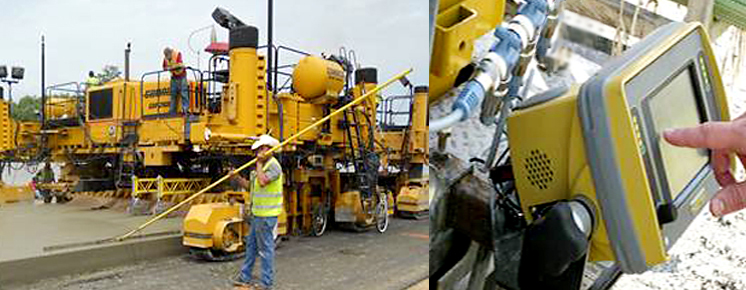
Proven technologies to identify surface irregularities that can impact concrete pavement smoothness, and provide opportunity for corrections in real time.
Tools to Improve PCC Pavement Smoothness During Construction (R06E)
Challenge
Smooth concrete pavements are more durable and lead to lower maintenance and vehicle operating costs. In addition, transportation agencies recognize the importance of smooth-riding pavements to the traveling public. Most States have implemented smoothness specifications for concrete pavements that require measurement of the surface profile on the finished pavement for acceptance testing. However, there is often no indication of smoothness prior to testing on the finished, hardened concrete. Problems not corrected in real time can lead to significant expenditures correcting surface irregularities.
Solution
SHRP2 evaluated and tested several innovative technologies that improve process control and allow for on-the-fly equipment and operations adjustments to correct surface irregularities on concrete pavements during construction, while the concrete is in a plastic state. Ideally, deviations are detected and corrections made in real time, eliminating the need to grind the final hardened surface to achieve smoothness requirements. The report, lessons learned, and model specifications developed under this project provide improved guidance on the use of real-time smoothness technologies and a better understanding of which construction artifacts affect smoothness.
The final project report recommends:
- Tools to evaluate pavement smoothness in real time.
- Tools to complement existing quality control.
- Tools to reduce must-grinds and thus reduce project delays and claims.
Benefits
Access to real-time information on pavement smoothness will help paving contractors with their process control and meet the ride quality requirements of transportation agencies. Use of these technologies results in higher quality pavements delivered in less time and for less money, thereby minimizing the impact on the traveling public.
-

Save Lives
Evaluating and improving pavement smoothness in real time before the pavement hardens means that roads can be traffic-ready sooner, thus reducing the exposure of workers and drivers to work zone hazards.
-

Save Money
Evaluating and improving pavement smoothness in real-time, can eliminate the need to grind hardened concrete at the end of construction to achieve desired smoothness, resulting in lower project costs.
-

Save Time
Evaluating and improving pavement smoothness while the pavement is still fresh results in a finished surface that meets smoothness specifications, eliminates post-construction grinding, and allows roads to be opened faster.


